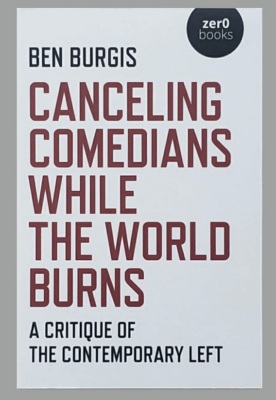Podcaster, author, and philosopher Ben Burgis recently published a short series of essays called Canceling Comedians While The World Burns. In this body of work, Burgis positions himself as a critic of certain tendencies on the left. But he critiques these tendencies from a strategic, (genuinely) sympathetic, and constructive perspective.
I think that’s a good idea. In fact, I try to do it myself from time to time. And not just because I’m also a philosopher and we like that sort of thing. Though I am also a philosopher, and we do like that sort of thing. Rather, because it’s a practical, useful skill for the left. We should think more deeply about strategy. And we should think about how our choices and public presentation affect how and whether we recruit new members, appeal to target audiences, and achieve results.
Burgis writes Canceling Comedians While The World Burns with these things in mind, and I’ll keep them in mind in discussing his book.
‘Canceling Comedians While The World Burns’
I found myself asking what Burgis was going for with the title of this book. He references it (and related themes) several times in the essays. And, of course, it stands out to the sort of leftist readership Burgis is going for here.
It’s obvious enough that the title is a historical metaphor. Many readers know the story. But for anyone who doesn’t, Emperor Nero allegedly ‘fiddled while Rome burns.’
Don’t worry too much about historical accuracy. Nero probably didn’t play a fiddle at all, let alone do so while Rome caught fire and burned to the ground in 64 CE. But that’s not the point. Nero dealt with trivial concerns while more important things happened in the background. More important things like the capital of his Empire burning to the ground.
Burgis obviously thinks leftists who practice ‘cancel culture’ do something analogous. They fiddle around with their trivial pursuits while the world burns around them. In his essays, Burgis argues in different ways that leftists worry too much about cultural affronts and sleights. He thinks the culture wars distract them from systemic, fundamental problems that afflict our world. Problems like Trumpism and identity-based oppression. Not to mention capitalism.
“But We’re Not Emperors”
There’s an obvious – though ultimately, I think, uninformed – objection to Burgis’s central metaphor in Canceling Comedians While The World Burns.
Nero was the Emperor! Of course he needs to stop fiddling and do something! He holds all the power in Rome, and he’s the best person to act. By contrast, so the reasoning goes, leftists (or progressives, or DSA members, or Twitter leftists, or whatever group one is defending here) are just bit players. They’re a bunch of ordinary people. What could they possibly do to stop all these larger, systemic issues?
If they retreat to cultural navel-gazing, can we really blame them?
But Burgis recognizes this potential response. And I think one key strength of his book is that, in many different ways across his essays, he challenges it. Does he succeed in doing so? Maybe. But whether he convinces anyone or not, he pushes the notion that ordinary people can play a part of a larger working class agent of social change.
And that’s a message worth having and repeating on the left.
Activist Subculture and the Left
By putting together regular, working-class people – everyone from members of activist subcultures to those who lack any political views or inclinations – we can create an international movement to overthrow capitalism and build a socialist future. Or so the core message of Burgis’s book tells it.
And, yes, that’s what I signed up for when I became a socialist. Burgis, I think, places himself in this camp.
But, at other, darker moments, he certainly doesn’t seem to be in this camp. At least not quite. At several points, he situates ‘activist subculture’ outside the working-class agent of social change. Ultimately, though, I read these moments more as markers of frustration than as actual exclusionary views. I certainly have my own moments of frustration with activist subculture.
Canceling Comedians
Burgis covers a wide range of cultural topics over the last 5-10 years. And even if those cultural topics become dated in upcoming years, the underlying point shouldn’t. Even readers who return to this book in, say, 2025 or 2030 should be able to read Burgis on the 2019 Twitter cancellation of Barbara Ehreinreich and still get something out of it.
Each essay hits at leftist culture in a way we should continue to find relevant. Indeed, I spent so much time on the title of the book because it gets particularly well at leftist culture and the tensions at work. Burgis considers the excesses of cancel culture. He looks at the poor strategic choices leftists make, the ways leftists turn off potential new members, and leftist ideas and impulses about where to publish and who to engage with.
Burgis settles on a strategic objection to cancel culture. And it’s one we ought to take seriously. He argues that in the ways we, as leftists, implement cancel culture, we scare off ‘normies.’ We scare off the very people we need to recruit to our movements in order to build power.
And it’s a point worth considering. Do I fully endorse Burgis on this? Not exactly. Focusing on strategic concerns carries the risk of excusing bad behavior. But it doesn’t necessarily lead to excusing bad behavior. Rather, it provides us with a counter-point to consider before joining the next Twitter pile-on. It provides us reason for reflection before we turn our next public activist meeting into a church- or cult-like confessional.
So, here’s the upshot. I don’t always agree with Burgis. But I do think he always builds a decent argument for us to consider, and he often makes a point worth making.
That’s refreshing and far too rare.
